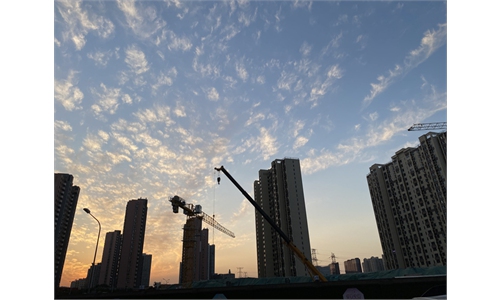Chinese real estate stocks soar, propped up by imminent policy easing
Housing supply, demand relationship has drastically altered: experts

Citizens visit a property developer's sales office in Ningbo, East China's Zhejiang Province, on March 4, 2023. Photo: VCG
China's property sector, which has played a major role in fueling the nation's economic growth in recent years, is expected to regain momentum in the second half as restrictive policies are eased in multiple cities following a key leadership meeting, experts told the Global Times.
The meeting convened by the Political Bureau of the Communist Party of China (CPC) Central Committee on Monday called for adaption to the new situation, as major changes have taken place in the relationship between supply and demand in China's real estate market.
"Real estate policies should be adjusted and optimized in a timely manner," the meeting said, adding that the policy toolkit should be well utilized with city-specific measures to better meet residents' essential housing demand and their need for better housing, and advance the stable and sound development of the real estate market, the Xinhua News Agency reported.
The signal released from the meeting indicated that the Chinese leadership attaches vital importance to the steady development of the real estate sector, after gaining sufficient awareness of the change in housing demand and supply, Yan Yuejin, research director at Shanghai-based E-house China R&D Institute, told the Global Times on Tuesday.
"Updated understanding of the dynamic supply-demand relationship is crucial for analyzing the market trend and policy adjustment," Yan noted.
As for what policy changes will come, Yan said it indicated more than a simple loosening. "It is important to reverse or cancel the past rigorous policies in place since 2017 as they have diverged from the market fundamentals."
The principle that "houses are for living not for speculation" was reiterated in almost every CPC Central Committee meeting since 2019, but this time it did not appear, Huatai Securities said in a note, adding that it is a prompt move to reset the tone of the property industry now when the sector is dragging the heels of the nation's economic growth.
China's property investment fell 7.9 percent year-on-year to 5.86 trillion yuan ($819.8 billion) in the first half of the year, according to data released by the National Bureau of Statistics (NBS).
In the first 20 days of July, new home transactions continued to drop, down 40 percent on a yearly basis, eroding the sales gains in the first quarter of the year when the economic rebound was running quickly post-pandemic, data from the E-house China R&D Institute showed.
To reverse the downtrend, industry observers have anticipated the government will ease the restrictions imposed on housing purchase.
"With supportive measures in the pipeline including easing home purchase restrictions, reducing mortgage rates and even moderately cutting the rates of existing mortgages, the second half may witness an upturn of property investment and sales," Wang Qing, chief macroeconomic analyst at Golden Credit Rating International, told the Global Times.
A notice circulating online showed that Changsha, capital of Central China's Hunan Province, is considering a decision to remove restrictions on home purchases and loans in a comprehensive way.
"It is highly likely that other cities will soon follow suit according to their own situations," Yan said.
As to financial terms, the five-year loan prime rate (LPR) is likely to be further reduced in the second half of 2023, Wang said.
Most new loans in China are based on the one-year LPR while the five-year LPR influences the pricing of mortgages.
"Relevant authorities are likely to accelerate the approval of the bond and equity financing of real estate developers. The large cities are expected to release more high-quality land to increase the proportion of residential land supply," said Lian Ping, chief economist and head of the Zhixin Investment Research Institute.
It is believed that with the combination of an array of optimized measures in place, the property sector is to achieve a soft landing, which is of great significance to stabilizing economic growth and defusing risks in the remainder of the year, Wang noted.
The Chinese leadership's move to prop up the property sector is part of its broader effort to bolster confidence in the world's second largest economy, where the recovery has been timid in the second quarter.
Real estate-related stocks led the rally on Tuesday as the market cheered the positive real estate policy adjustment.
Stellar performances among real estate stocks included Gemdale Corp, Jinke Realestate Group and a dozen other developers, with their prices rising by the daily limit of 10 percent, while other developers rose by more than 5 percent.
Even some debt-embattled developers saw their shares gain, which showed that the market anticipation for eased property policies and continuous improvement of the macro economy in the second half of this year has strengthened, according to Yan.


